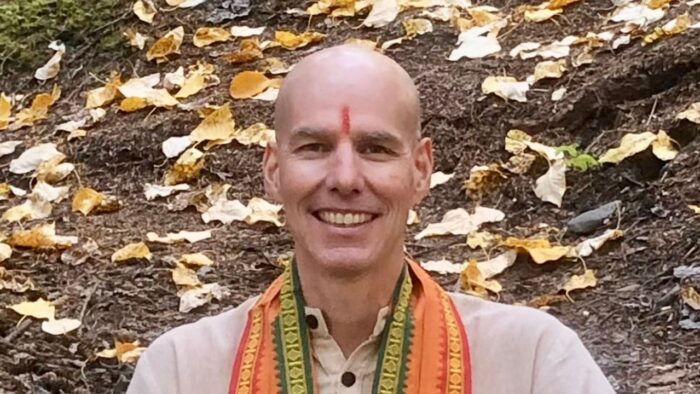A number of mystical experiences in his 30s, inspired Canada-based Jagatsevakji to choose a life of dharma. He’s a pujari, mantra teacher, jyotishi and author, and his sadhana is a union of all these diverse roles and he doesn’t even perceive them as diverse. “They are actually one role being expressed in different forms. The knowledge that is specific to each apparently separate part flows seamlessly into each of the other parts,” says Jagatsevakji. In conversation with Indica Yoga…
Sophia: You’re a pujari, mantra teacher, jyotishi and author: how do you unite these diverse roles and what inspired your interest in all of these knowledge systems?
Jagatsevakji: The roles combine the spiritual, philosophical and practical wisdom science of Vedic Sanatana Dharma. This is really the foundation that links everything together. So, in many ways, I don’t experience or perceive the roles as diverse. They are actually one role being expressed in different forms. The knowledge that is specific to each apparently separate part flows seamlessly into each of the other parts.
For example, when I’m offering puja, there’s the use of mantra and jyotiṣa timing principles. When teaching mantra, I’ll often help a student learn to perform an internal puja as well as include chants in praise of the planets and the Supreme Self. When providing jyotiṣa readings, the Vedic quest for truth, light and self-realisation guide the way. And when writing, I listen to the quiet mantric voice in the sacred heart that the Seers speak of in order to share true words of love and honesty. Jyotiṣa has also helped me become aware that, like many, many people, I was created to do more than one role in this lifetime.
The thread that unites this all is a happy devotion and joy in serving, coupled with a child-like enthusiasm for learning. The Vedic knowledge systems and overall way of thinking about the purpose of life just really make sense to me. The union of clear logic with heart-centred devotion and practical action steps provide a number of options for any spiritual aspirant. And when you add in the ‘all welcome, here’s an open-door to universal knowledge ’ spirit of the Vedas (not to confuse this with the non-inclusive lens of some groups), then viola, I knew I’d found a home and path that I could follow to the end.
Inspired is a great word because it suggests a divinely energised call to act. That’s exactly how I’ve experienced all of the training, studies, and service. It’s something that fills my heart-cup and brings light into each new day. I received ‘the call’ out of the blue in my early 30s when a number of mystical experiences changed my life. I’ve been chanting, studying and going further down the rabbit hole ever since!
Sophia: What does dharma mean to you?
Jagatsevakji: Living life according to Divine Will is dharma. For individuals, we can call this Svadharma; living in accordance with one’s own inherent nature and the deeper duty and purpose of the life one has been given - within the context and laws of the Cosmic or Universal Dharma. It reminds us that not all people in their current lifetime are meant to play the piano, be famous, write books, study Veda, become nurses, play sports, have limited resources, own a company, start an NGO, etc. We can also apply this principle to the elements, the cosmic bodies, and the different universes. Everything in creation has purpose - the wind cannot be fire nor can fire be water.
To quote a modern fable; “We do only what we’re meant to do. The Keymaker”
Sophia: How would you describe your connection to and experiences in India?
Jagatsevakji: Karmic, loving and very positive. While my ‘in-person’ India experiences to date have been from past lifetimes, I will be in India for extended studies and sādhana for one year starting this May. This will actually be the first time I physically travel there in this lifetime. I’m very happy and grateful for the opportunity.
In addition, for most of the past 25 years I’ve been blessed with friends, communities and teachers here from the Indian diaspora as well as doing regular distance studies with organisations and lineages from India.
Sophia: How did you reconcile a Western mindset with pluralist Indian philosophies?
Jagatsevakji: I never really had to reconcile these different mindsets. I was always drawn to global thinking, individual approaches to God and principles of a shared universal humanity from a young age. In fact, the spread of the ironically non-inclusive western mindset has been quite disheartening to behold and has likely served to deepen my path in a different direction.
Sophia: What mantras are closest to your heart and why?
Jagatsevakji: oṃ namo nārāyaṇāya springs from the subtle electric blue flame of my heart. It is a constant reminder of my love for Nārāyaṇa, Who is the Divine form of God for me.
oṃ duṃ durgāyai namaḥ and durgā sūktam centres me in some of the first direct experiences with the Divine Mother that continue to nurture life’s bliss.
nārāyaṇa sūktam and nārāyaṇa upaniṣat speak of God in a way that are true for me.
Sophia: What are your favourite books on spirituality?
Jagatsevakji: The english translation of Uddhava Gīta by Swami Ambikananda Saraswati and these three books by Sadguru Sant Keshavadas; Prema Yoga, Liberation from Karma and Rebirth, and Sadguru Dattatreya.
Sophia: Can you share any special moments from your spiritual journey that changed the way you think?
Jagatsevakji: There have been many of what one may call ‘direct experiences or direct contact’ that changed my perception of life here. One with the Divine Mother occurred through my eldest daughter during her early childhood. It helped me know the eternal nature of true love and that Divine is an always present reality. This experience opened me to seeing Divine in others as well…something that has been thankfully expanding ever since.
Sophia: When is a person ready to follow the spiritual path in life?
Jagatsevakji: It is different for each being as God is infinitely creative. Still, there are several signs that tend to appear. These are just some of the more common ones that frequently start the spiritual quest in more earnest:
- the blossoming of spiritual awareness in the heart and mind that there is ‘something’, some ‘purpose’ greater than the individual ‘me’
- an increasing dissatisfaction with the trappings of the material world
- a growing desire to deeply know the truth of existence and purpose of life
- a direct experience with Divine (which, of course, is already happening)
- a deep call to serve
- when a person has fulfilled their life duties, and/or are able to continue to do so while integrating the demands, trials, and tribulations of the spiritual path
- a passage in a book, a talk or presentation, a conversation with a stranger, an uplifting experience in nature … all of these are just some of the ways God has planted the seeds in our consciousness
Commitment, discipline, and surrender are also key ingredients. The spiritual path is not a trend or commodity, it is a way of being that comes fully alive the more one strengthens the commitment to practise with all the mind-body-heart muscles one can muster. Many will also be called to find a Guru. In our times it is somewhat rare to meet a true Guru, a knower of Brahman. Though when it does - and one is ripe - it can definitely get one flowing full speed ahead on the path.
Sophia: Is there anything you don’t like about India?
Jagatsevakji: I prefer smaller crowds. 🙂
Sophia: Any advice for young spiritual aspirants?
Jagatsevakji: I had a smile and happy laugh at the ‘young spiritual aspirants’ part since I still sincerely feel like a young aspirant. I would guide young aspirants to align with teachings, teachers and practices that are grounded in genuine compassion, love, and kindness; that do no harm to themselves or others. To find the Guru within and without who demands nothing but gives everything … and then repeat that in their own lives.
To seek with all their being to know the source of all love, to sow the seeds of love, and to be that very love - whether that be through jñana, karma, raja, bhakti or any other path that nurtures the same.
To do their very best to make each day an offering of gratitude and surrender, in whatever form (or non-form) that takes for them.
To commit fully to their chosen path. In the early stages it can be natural and even helpful to sample as we are learning about ourselves. But once the knowing is known then in order to make real progress, so to speak, one must live and breathe the chosen Way in all parts of life.
To cultivate and practise patience - it’s one of life’s true blessings with many surprising gifts.
And schedule time each and every day to connect in some form of centred meditation, conversation, or prayer with both their true heart-self (the soul within) and the Supreme Divine Self that resides in all that is. As my Sadguru said, God has given us 24 hours to live each day, can we not set aside even 10 or 20 minutes to give back?





